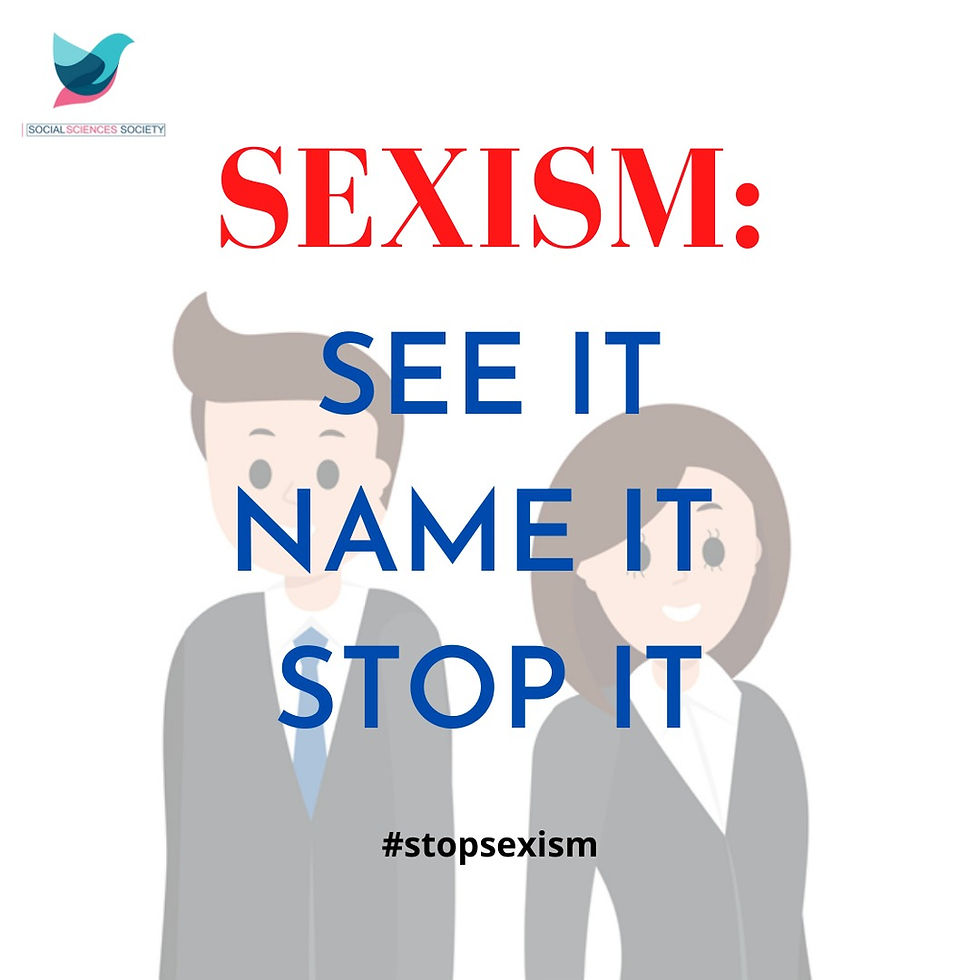Stop Sexism
- Maha Ali Rizvi Blog Writter SZABIST Social Sciences
- Jul 4, 2021
- 3 min read

By: Maha Ali Rizvi
Sexism is part of our daily lives, runs in every household; is part of every conversation we hold with every unconscious remark and yet we fail to acknowledge why the world is full of such discrimination. While it’s important to work on fixing the big issues, it’s the small and seemingly harmless instances of everyday sexism that are also working to maintain and normalise inequality between men and women. From catcalling to being called a “good girl” as a grown woman, there's sexism everywhere.
Breeding negativity
Case studies in psychology that we study in our courses have shown the impact language has on our development, confidence and status in society. The words we use can influence, incite us to fight wars, hurt, undermine, demonise and demean. Subconsciously, they can also influence our mood or our thinking capability too. Recently I was searching on “negative talk” and how it can affect your personality on google and to my shock it had more than 14 million articles on it written by some psychologists and sociologists and they even provided solutions to it yet our negative collective vernacular on gender remains unchallenged. That's why I say it is time we collectively call time on gendered language. If we all chose our words more carefully, we could make a difference to the way women are treated, and reflected, in society.
"Boys will be Boys"
This phrase is like cancer for our society and this is why; when this phrase is employed, it’s usually to excuse any form of a boy’s misdemeanor. Not only does this excuse the wrong done by males but the phrase conveniently strips them off of any accountability for their actions, since ‘boys will be boys’ regardless of the gravity of their doings. This notion from a young age feeds the vulnerable minds an idea of false power, ‘You can get away with it because you were born a boy’. If they’re incompetent to anticipate the repercussions of their actions, it’s not because they’re males and their gender can’t help it, its because they choose to be that way and we let them. Have some social responsibility and snip lethal patriarchy in the bud.
"Who wears the pants?"
This question doesn’t do justice to either of the genders in a relationship. When you assign one person as wearing the pants you undeniably pigeonhole them with stereotypical roles which imply that one is better at a task than the other. Calling a woman as wearing the pants in the relationship emasculates the man and calling a man as wearing the pants creates a notion of the woman’s lack of control over their narrative. Last time we checked, a couple’s relationship dynamic is not your or our business, so do yourselves a favor and stop asking who wears the pants. They both do. Let’s leave it at that.
"Man up"
The other we associate gaining strength with a gender, we are undermining the power of the opposite gender. As if to say, that failing to act like a man automatically places you in a ‘feminine’ category which is considered ‘weak’. This does not do men any favours either, they are indirectly asked to ‘Man up and suppress their feelings’ which takes a mental toll like no other. On the contrary, it furthermore promotes toxic masculinity which in a country full of inflated male egos, we definitely need less of. Every second you spend reading this, there is a woman out there giving birth, A strong woman enduring heights of pain and exhibiting vigor. Aren’t women also the epitome of strength, and yet you rarely hear anyone say, ‘Woman up’?
“Don’t worry you pretty little head”
Something I personally hate hearing and I really want to bust this myth that pretty or attractive people cannot be smart. I was in my A Levels when my class fellow passed this remark on me, that “never knew pretty tall girls can be intelligent too.” It sent chills down my spine. I don't know why there's this misconception?
An individual’s IQ doesn't depend on the level of their physical attractiveness. This phrase is so demeaning that it needs no further explanation as to why its retirement must be imminent
Sexism is prejudice or discrimination based on a person’s sex or gender. This prejudice and discrimination can be hostile and overt or seemingly benevolent and more subtly harmful. It can lead to a wide range of harmful behaviors, from acts of violence. All manifestations of sexism are harmful and have a negative impact on society. Women are most severely affected, but sexism also affects people of other marginalized genders. Less directly, it also harms men. To stop sexism, it is crucial to understand how it manifests and then to challenge sexist attitudes and practices at all levels — from the internal to the institutional.



Comments